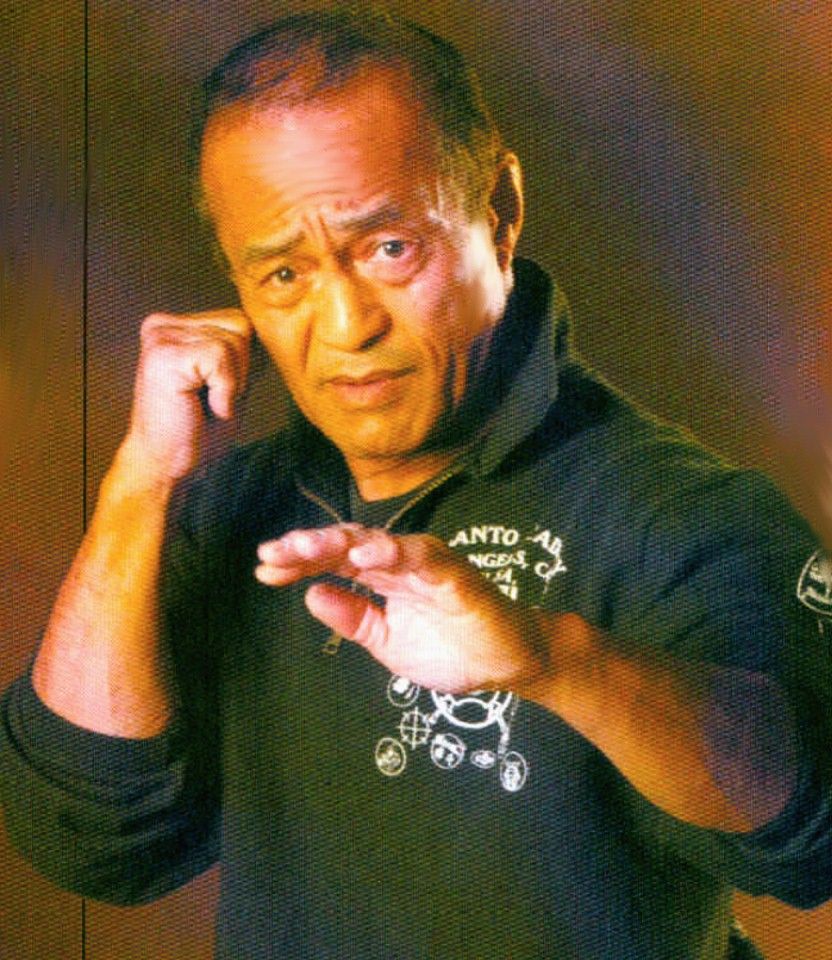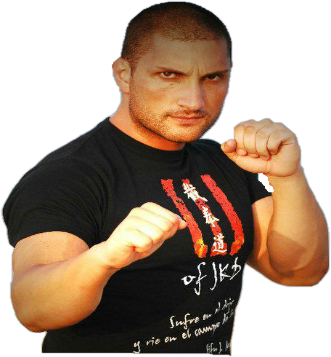"Talking trash"
Ali regularly taunted and baited his opponents—including Liston, Frazier and Foreman—before the fight and often during the bout itself. Ali's pre-fight theatrics were almost always highly entertaining, and his words were sometimes cutting, and were largely designed to promote the fight. His antics often targeted a particular psychological trigger or vulnerability in his opponent that would provoke a reaction and cause the opponent to lose focus. He said Frazier was "too dumb to be champion", that he would whip Liston "like his Daddy did", that Terrell was an "Uncle Tom" and that Patterson was a "rabbit". Ali was a master of provocation, and he had a clear understanding that what one did to an opponent outside the ring could be even more crucial than what one did to him in the ring. In speaking of how Ali stoked Liston's anger and overconfidence before their first fight, one writer commented that "the most brilliant fight strategy in boxing history was devised by a teenager who had graduated 376 in a class of 391."
Publication Information
- Historical : Muhammad Ali
- Birth Name : Cassius Marcellus Clay, Jr.
- Other names : The Greatest, The People's Champion, The Louisville Lip
- Born : January 17, 1942, Louisville, Kentucky, U.S.
- Died : June 3, 2016 (aged 74), Scottsdale, Arizona, U.S.
- Cause of death : Septic shock
- Resting place : Cave Hill Cemetery, Louisville, Kentucky, U.S.
- Monuments : Muhammad Ali Center, Muhammad Ali Mural, Los Angeles, CA
- Gender : Male
- Height : 191 cm
- Occupation : The Greatest World Heavyweight Champion Boxer, Religious and Charitable Work
- Ethnicity : African American
- Religion : Sunni Islam
- Spouse(s) : Sonji Roi (m. 1964; div. 1966), Belinda Boyd (m. 1967; div. 1977), Veronica Porché Ali (m. 1977; div. 1986), Yolanda Williams (m. 1986–2016)
- Children : 9, including Laila Ali
- Parent(s) : Cassius Marcellus Clay Sr., Odessa Grady Clay
- Awards : List Of Awards
- No Of Pages : Page 1 | Page 2 | Page 3 | Page 4
Ali typically portrayed himself as the "people's champion" and his opponent as a tool of the (white) establishment (despite the fact that his entourage often had more white faces than his opponents). During the early part of Ali's career, he built a reputation for predicting rounds in which he would finish opponents, often vowing to crawl across the ring or to leave the country if he lost the bout. Ali admitted he adopted the latter practice from "Gorgeous" George Wagner, a popular professional wrestling champion in the Los Angeles area who drew thousands of fans to his matches as "the man you love to hate".
ESPN columnist Ralph Wiley called Ali "The King of Trash Talk". The Guardian recently lamented the decline of the "golden age of trash talking" in boxing which, it said, was exemplified by Muhammad Ali. The Bleacher Report called Clay's description of Sonny Liston smelling like a bear and his vow to donate him to a zoo after he beat him the greatest trash talk line in sports history.
Legacy
Muhammad Ali defeated every top heavyweight in his era, which has been called the golden age of heavyweight boxing. Ali was named "Fighter of the Year" by Ring Magazine more times than any other fighter, and was involved in more Ring Magazine "Fight of the Year" bouts than any other fighter. He is an inductee into the International Boxing Hall of Fame and holds wins over seven other Hall of Fame inductees. He is one of only three boxers to be named "Sportsman of the Year" by Sports Illustrated.
In 1978, three years before Ali's permanent retirement, the Board of Aldermen in his hometown of Louisville, Kentucky, voted 6–5 to rename Walnut Street to Muhammad Ali Boulevard. This was controversial at the time, as within a week 12 of the 70 street signs were stolen. Earlier that year, a committee of the Jefferson County Public Schools considered renaming Central High School in his honor, but the motion failed to pass. At any rate, in time, Muhammad Ali Boulevard—and Ali himself—came to be well accepted in his hometown. In 1993, the Associated Press reported that Ali was tied with Babe Ruth as the most recognized athlete, out of over 800 dead or alive athletes, in America. The study found that over 97% of Americans over 12 years of age identified both Ali and Ruth.
 He was the recipient of the 1997 Arthur Ashe Courage Award. Two years later, in 1999, the BBC produced a special version of its annual BBC Sports Personality of the Year Award ceremony, and Ali was voted their Sports Personality of the Century, receiving more votes than the other four contenders combined. On September 13, 1999, Ali was named "Kentucky Athlete of the Century" by the Kentucky Athletic Hall of Fame in ceremonies at the Galt House East. On January 8, 2005, Muhammad Ali was presented with the Presidential Citizens Medal by President George W. Bush. Later that November, he received the Presidential Medal of Freedom at a White House ceremony. and the "Otto Hahn Peace Medal in Gold" of the UN Association of Germany (DGVN) in Berlin for his work with the US civil rights movement and the United Nations (December 17, 2005).
He was the recipient of the 1997 Arthur Ashe Courage Award. Two years later, in 1999, the BBC produced a special version of its annual BBC Sports Personality of the Year Award ceremony, and Ali was voted their Sports Personality of the Century, receiving more votes than the other four contenders combined. On September 13, 1999, Ali was named "Kentucky Athlete of the Century" by the Kentucky Athletic Hall of Fame in ceremonies at the Galt House East. On January 8, 2005, Muhammad Ali was presented with the Presidential Citizens Medal by President George W. Bush. Later that November, he received the Presidential Medal of Freedom at a White House ceremony. and the "Otto Hahn Peace Medal in Gold" of the UN Association of Germany (DGVN) in Berlin for his work with the US civil rights movement and the United Nations (December 17, 2005).
On November 19, 2005 (Ali's 19th wedding anniversary), the $60 million non-profit Muhammad Ali Center opened in downtown Louisville. In addition to displaying his boxing memorabilia, the center focuses on core themes of peace, social responsibility, respect, and personal growth. A youth club in Ali's hometown and a species of rose (Rosa ali) have been named after him. On June 5, 2007, he received an honorary doctorate of humanities at Princeton University's 260th graduation ceremony.
Ranking in heavyweight history
Ali is generally considered to be one of the greatest heavyweights of all time by boxing commentators and historians. Ring Magazine, a prominent boxing magazine, named him number 1 in a 1998 ranking of greatest heavyweights from all eras.
Ali was named the second greatest fighter in boxing history by ESPN.com behind only welterweight and middleweight great Sugar Ray Robinson. In December 2007, ESPN listed Ali second in its choice of the greatest heavyweights of all time, behind Joe Louis. The Associated Press voted Ali the No. 1 heavyweight of the 20th century in 1999.
In the media and popular culture
As a world champion boxer and social activist, Ali has been the subject of numerous books, films and other creative works. In 1963, he released an album of spoken word on Columbia Records titled I Am the Greatest He has appeared on the cover of Sports Illustrated on 37 different occasions, second only to Michael Jordan.
He appeared in the documentary film Black Rodeo (1972) riding both a horse and a bull. His autobiography The Greatest: My Own Story, written with Richard Durham, was published in 1975. In 1977 the book was adapted into a film called The Greatest, in which Ali played himself and Ernest Borgnine played Angelo Dundee.
When We Were Kings, a 1996 documentary about the Rumble in the Jungle, won an Academy Award, and the 2001 biopic Ali garnered an Oscar nomination for Will Smith's portrayal of the lead role. The latter film was directed by Michael Mann, with mixed reviews, the positives given to Smith's portrayal of Ali. Prior to making the film, Smith rejected the role until Ali requested that he accept it. Smith said the first thing Ali told him was: "Man you're almost pretty enough to play me."
Ali had a cameo role in the 1962 film version of Requiem for a Heavyweight, and during his exile, he starred in the short-lived Broadway musical, Buck White (1969). The film Freedom Road, made in 1978, features Muhammad Ali in a rare acting role as Gideon Jackson, an ex-slave in 1870s' Virginia who gets elected to the U.S. Senate in Washington, D.C., and battles other former slaves and white sharecroppers to keep the land they have tended all their lives.
On the set of Freedom Road Ali met Canadian singer-songwriter Michel, and subsequently helped create Michel's album entitled The First Flight of the Gizzelda Dragon. and the hour-long television show With Love From Muhammad Ali. In 1979, Ali guest-starred as himself in an episode of the NBC sitcom Diff'rent Strokes.
For contributions to the entertainment industry, Ali was honored with a star on the Hollywood Walk of Fame at 6801 Hollywood Boulevard. Ali recorded the song "Stand by Me" in 1964.
The Muhammad Ali Effect is a term used in psychology that was named after him when he stated in his autobiography The Greatest: My Own Story: "I only said I was the greatest, not the smartest." According to this effect, when people are asked to rate their intelligence and moral behavior in comparison to others, people will rate themselves as more moral, but not more intelligent than others.
The Trials of Muhammad Ali, a documentary directed by Bill Siegel that focuses on Ali's refusal to serve during the Vietnam War, opened in Manhattan on August 23, 2013.
Related Post : Source : wikipedia / nbcnews










